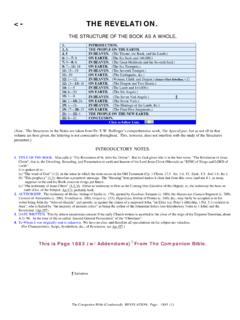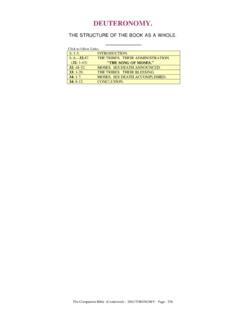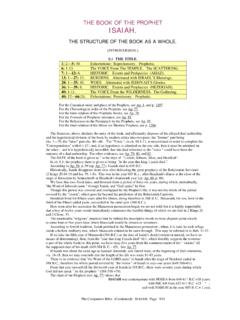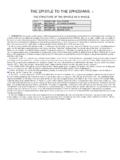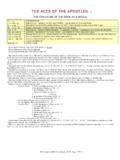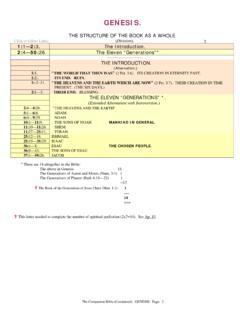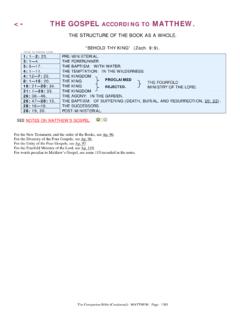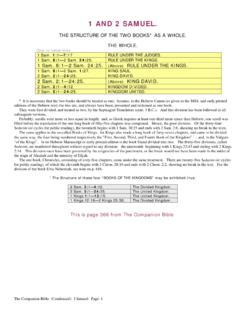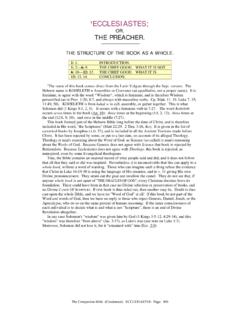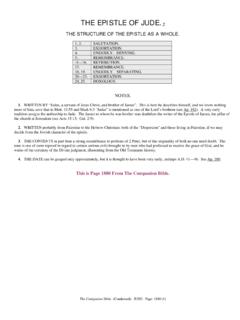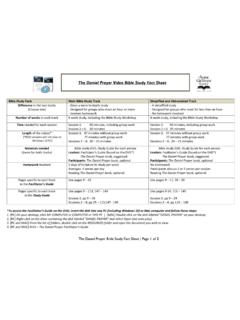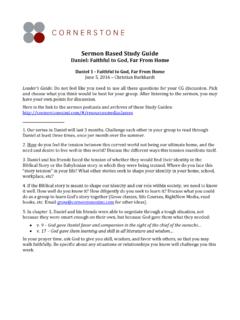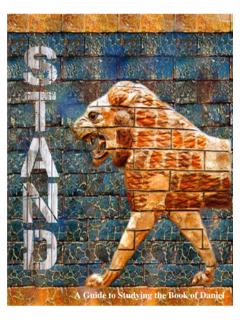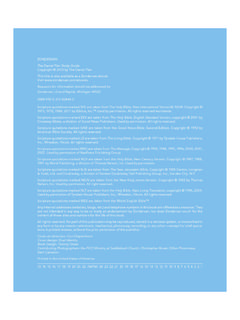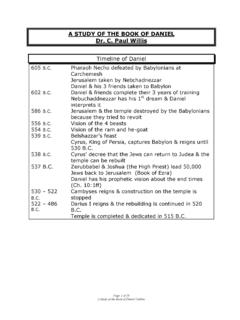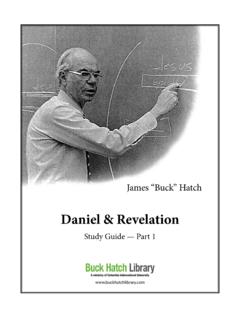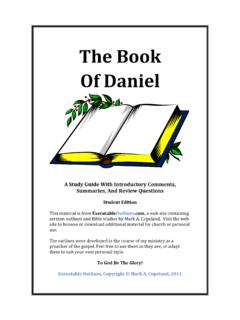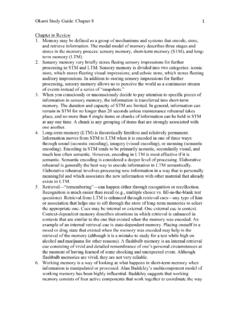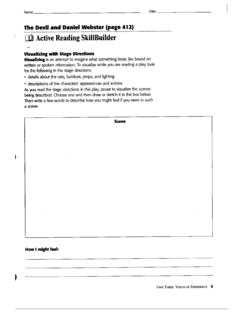Transcription of THE BOOK OF DANIEL. - Companion Bible (Condensed
1 THE book OF daniel . The Companion Bible (Condensed) : daniel : Page: 1178 (1) THE STRUCTURE OF THE book AS A WHOLE. Click to follow Links. (Introversion) 1: 1 21. THE CAPTIVITY OF JUDAH. Historical Events Connected with its Beginning. *(Historic) 2: 1 49. THE DREAM OF NEBUCHADNEZZAR. The Beginning and Duration of Gentile Dominion. 3: 1 30. daniel S COMPANIONS. The fiery Furnace . Angelic Deliverance. 4: 1 37. THE FIRST KING OF BABYLON. Nebuchadnezzar s Dream of The Great Tree , Revealing his Temporary Deposition. 5: 1 31. THE LAST KING OF BABYLON. Belshazzar s Vision of The Hand , Revealing his Final Doom. 6: 1 28. daniel HIMSELF. The Den Of Loins . Angelic Deliverance. 7: 1 8: 27. THE DREAM AND VISION OF daniel . The End of Gentile Dominion. *(Prophetic) 9: 1 12: 13.
2 THE DESOLATIONS OF JERUSALEM. Prophetic Announcements Connected with Their End. For the Canonical Order and Place of the Prophets, see Ap. 1. For the Chronological Order of the Prophets, see Ap. 77. For the Inter-relation of the Prophetic Books, see Ap. 78 and Structure on p. 1206. For References to the Pentateuch in the Prophetic Books, see Ap. 92. For the Visions of chs. 7 12, see Ap. 89. For the Numbered Days in 8:14; 12:7, 11, 12, see Ap. 90. For the Seventy Weeks of daniel (9:25 27), see Ap. 91. The position of the book in the Hagiographa , or third division of the Old Testament ( the Psalms , see Ap. 1), rather than in the second division ( the Prophets ), may be explained by the fact that, unlike the other three greater prophets (Isaiah, Jeremiah, and Ezekiel), it stands in relation to them as the Apocalypse of the Old Testament; and as pertaining to what is yet future.
3 And whereas those three greater prophets speak of the future from an Intro-Israelitish standpoint, daniel has their prophecies as his background; and, instead of looking at Zion and its neighboring peoples, daniel has universal Monarchies as his perspective; and is therefore separated from them in the Hebrew Canon, becoming to us the light or lamp of 2 Pet. 1:19, and the realization of 1 Pet. 1:11. The first part of the book (1:1 6:28) is historic, while the latter half (7:1 12:13) is prophetic. Moreover, of the former portion, 2:4 7:28 is written in Aramaic (or Chaldee), while the latter portion, 8:1 12:13, is written in Hebrew. This is to teach us that the historic portion is in the Gentile language, because it is concerned with the times of the Gentiles , and with Gentile supremacy in relation to Israel; while the prophetic portion is in Hebrew (the language of Israel), because it is concerned with the time of the end , and with the events which will lead up to the time when God will restore again the kingdom to Israel (Acts 1:6).
4 In Hezekiah s day (604 ) Syriac (or Aramaic) was not understood by the Jews (2 Kings 18:26); but after the Exile, in Ezra s day (426 ) both languages were generally understood; and both could be, and were, thus used by him. If an impostor had written the book in Hebrew some 250 years later (as alleged by modern critics), why should he have defeated his own object by writing any portion in Aramaic as well, thus proving himself to be a fool as well as a forger ? daniel . The Companion Bible (Condensed) : daniel : Page: 1179 (2) 1 In the third year of the reign of Jehoiakim king of Judah set out Nebuchadnezzar king of Babylon unto Jerusalem, and besieged it. 2 And the Lord gave Jehoiakim king of Judah into his hand, with part of the vessels of the house of God: which he carried into the land of Shinar to the house of his god; and he brought the vessels into the treasure house of his god.
5 3 And the king spake unto Ashpenaz the master of his eunuchs, that he should bring certain of the sons of Israel, of the king's seed, and of the nobles; 4 Youths in whom was no blemish, but well favoured, and skilful in all wisdom, and skilful in knowledge, and understanding science, and such as had ability in them to stand in the king's palace, and whom they might teach the books and the tongue of the Chaldeans. 5 And the king appointed them a daily provision of the king's food, and of the wine which he drank: so nourishing them three years, that at the end thereof they might stand before the king. 1 Sam. 17. 12. 2 Sam. 2. 24; 12. 16; 17. 25; 20. 3, 8. 1 Chron. 2. 21. Ps. 66. 12. Ezek. 36. 20, 21, 22; 41. 3. It is translated "go", in the sense of proceed or set out, in Deut. 4. 1; 6. 18; 8. 1; 11. 8; 12. 26; ; 26. 3. Josh. 23. 12. Ruth 3.
6 4. 1 Sam. 25. 5, &c. Jonah 1. 3, &c. It is rendered "entered " (of setting out) in 2 Chron. 27. 2. Job 38. 16, 22. Jer. 9. 21; ; 17. 25; 22. 4; 34. 10; 37. 16. Lam. 1. 10. Ezek. 44. 2; 46. 2. Dan. 11. 40, 41. Amos 5. 5. Obad. 11. Zech 5. 4. Nebuchadnezzar did set out in Jehoiakim's third year, but was delayed by fighting the battle with Pharaoh-necho at Carchemish. In the next (the fourth) year (Jer. 46. 2), he carried out the object with which he set out. Cp. 2 Kings 24. 1, and 2 Chron. 36. 6, 7. Nebuchadnezzar. This name is so spelt ( with "n" instead of "r") by Berosus (who wrote his history from the monuments, Cent. 3, ). Both spellings were in vogue. Ezekiel uses the "r"; and Jeremiah uses "r" before en. 27; and then eight times the "n" (27. 6 where Nebuchadnezzar is once specially called Jehovah's appointed servant, 8, 20; 28.)
7 3, 11, 14; 29. 1, 3); and after that, always with "r" except twice (34. 1; 39. 5). It is spelt with "n" in 2 Kings 24. 1, 10, 11; 25. 1, 8, 22. 1 Chron. 6. 15. 2 Chron. 36. 6, 7, 10, 13. Ezra 1. 7; 2. 1. Neh. 7. 6. Est. 2. 6). 2 the LORD*. One of the 134 places where the Sopherim say they altered "Jehovah" of the primitive text to"Adonai". See Ap. 32. gave. See Isa. 39. 6, 7. Jer. 25. 8-11. Ezek. 21. 26,27. part. Others were brought later (2 Kings 24. 13. 2 Chron. 36. 10). See Ezra 1. 7 for the subsequent restoration of them by Cyrus. God. Heb. Elohim. Ap. 4. I. the land of Shinar. Ref. to Pent. (Gen. 10. 10; 11. 2; 14. 1, 9). Ap. 92. Outside the Pentateuch found only in Josh. 7. 21 (Heb. text). Isa. 11. 11. Zech. 5. 11; and here. 3 the master of his eunuchs.
8 Heb. rab sarisayn = master or chief of the eunuchs; whence the title "Rab-saris" in 2 Kings 18. 17. See note there. Called "prince" in v. 7. children = sons. and = even, or both. Some codices, with six early printed editions, omit this "and": reading "sons of Israel, of the king's seed" (or "seed-royal"). princes = nobles. Heb. partemim, a Persian word, found only here and Est. 1. 3; 6. 9. Not the same word as in vv. 7, 8, 10, 11, &c. 4 Children = Youths. cunning = skilful. in the king's palace. The Inscriptions show that there was a palace school with elaborate arrangements for special education. See below on "Chaldeans", and notes on 2. 2. learning = character, or books.
9 See Prof. Sayce's Babylonian Literature : which shows the existence of a huge literature and famous libraries, in which were arrangements for procuring books from the librarian as in our own day. These books related to all subjects, and were classified according to their subjects (pp. 12-14). tongue. This was a special and important department. Chaldeans. A name not peculiar to daniel . From Genesis onward it is met with, especially in Jeremiah. They were distinct from the Babylonians (Jer. 22. 25. Ezek. 23. 23), and belonged to South Babylonia. Used here of a special class, well known as such at that time (cp. 2. 2, 4, 5, 10), and distinct also from other learned classes (2. 4). The word (Heb. Chasdim) is used also in the wider sense of a nationality (5. 30). See Dr. Pinches on The Old Testament, p.
10 371; Rawlinson's History of Herodotus, vol. i; pp. 255, 256; and Lenormant's The Ancient History of the East, i. pp. 493-5. 5 meat = food. Heb. pathbag. A Persian or Aryan word. Occurs only in daniel . wine. Heb. yayin. Ap. 27. 1. three years. Say 497, 496, and 495 B. C. See note on 2. 1. It does not say these years were concluded before the events of ch. 2 took place. stand before the king. Ref. to Pent. (Gen. 41. 46). daniel = GOD [my] Judge, which accords with the character and contents of the book . daniel was of the seed-royal of Judah. See note on v. 3. He is mentioned thrice by Ezekiel, his contemporary (14. 14, 20; 28. 3), and once by our Lord. In Matt. 24. 15 (Mark 13. 14), the Lord referred also to Dan. 8. 13; 9. 27; 11. 31; 12. 11. In Matt. 24. 30; 26. 64. Mark 14. 62.
